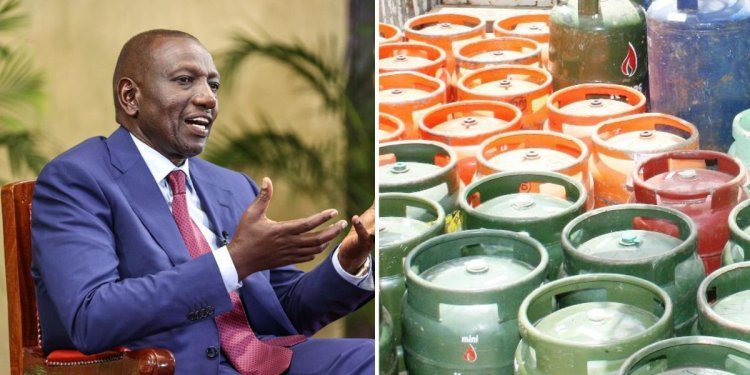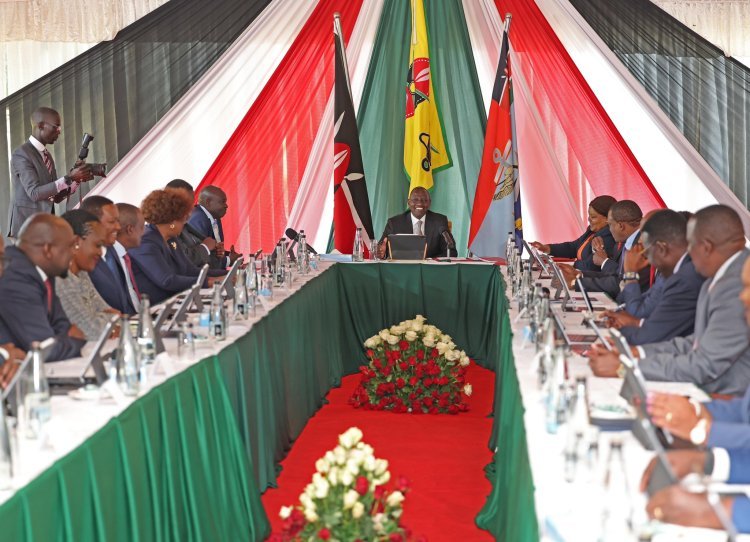Ruto Govt Starts To Reduce Cost Of Cooking Gas
The Cabinet considered and approved the Liquefied Petroleum Gas (LPG) Growth Policy.

Kenyans could soon be accessing affordable cooking gas at long last following several delays following an approval made by President William Ruto's Cabinet on Monday, October 9.
According to a despatch shared by State House spokesperson, Hussein Mohamed, the Cabinet considered and approved the Liquefied Petroleum Gas (LPG) Growth Policy.
"The Policy seeks to steer our nation along an irreversible path towards securing the dignity of all households through the use of safe and affordable LPG.
"The Policy provides a pathway for progressively weaning off the 70% of Kenyan households currently using biomass, Kerosene and other dirty fuels as their primary cooking fuel," read the despatch in part.

President William Ruto chairing a Cabinet meeting at Kakamega State Lodge on August 29, 2023. /PCS
Furthermore, as part of the LPG Growth Policy's proposed regulations, a framework requiring all housing developments to have provisions for liquefied petroleum gas reticulation infrastructure shall be implemented.
This provision will be embedded as a prerequisite for approval of any housing development projects, including those under the Administration's flagship programme on Affordable Housing.
"The proposed interventions will further encompass establishing common-user LPG import terminals, distributing subsidized LPG cylinders to low-income households, promoting LPG use in institutions, facilitated by partnerships with finance institutions, LPG players, and the Ministries of Education and Health," added the despatch.
According to the Cabinet, the measures aim to reduce consumer prices, improve public safety and contribute to both public health and environmental sustainability.
Reducing the cost of cooking gas is viewed as one of President Ruto's biggest headaches in ensuring that Kenyans can get cheaper and alternative cooking methods compared to use of wood fuel domestically.
On Sunday, May 14, the President was hard-pressed to explain to Kenyans why they would not benefit from the reduced prices of cooking gas by June 1, 2023, as he had promised.
Addressing the media during a joint interview at State House, Nairobi, the Head of State acknowledged that the promise to reduce the price of cooking gas to a range of Ksh300 minimum and Ksh500 maximum was over-ambitious.
He noted that the 2022/23 supplementary budget must first be passed before moving to lower the cooking gas prices and effect the same across markets in the country.
Amidst pressure to reduce the cooking gas prices, Ruto admitted that initial attempts to remove taxes on gas did not succeed in the supplementary budget, thus the promise would take longer to be fulfilled.
''We realised that if we had to do that then it would have required that we amend some law but as you can see we have that in the current budget," he stated.
Ruto clarified that the price of the gas cylinder would be the one to be reduced as compared to the cooking gas itself, which would make it easier for Kenyans to refill.
''We have to remove all the illegal fillers because they are undermining our efforts. What we were reducing between Ksh300-Ksh500 is the gas cylinder then you will be able to refill gas,'' Ruto said.
The tax exemptions on cooking gas were captured in proposals made during his Cabinet meeting on Thursday, April 27 whereby the government proposed exempting Liquefied Petroleum Gas (LPG) from Value Added Tax (VAT), as Ruto had promised on Thursday, March 2.
The strategy of scrapping VAT from LPG gas would be achieved through the Bottom-Up Economic Transformation Budget for the Financial Year of 2023/2024.







